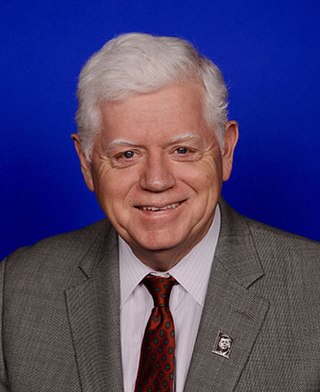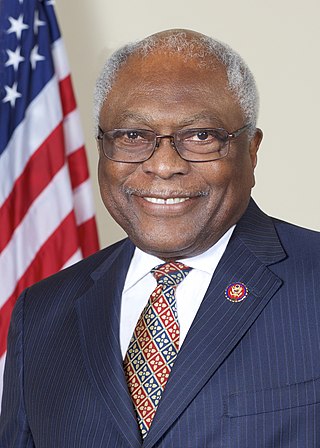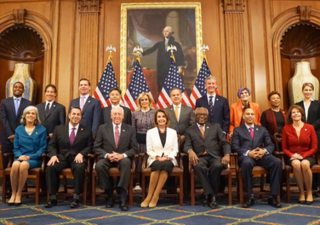
The positions of majority leader and minority leader are held by two United States senators and people of the party leadership of the United States Senate. They serve as a chief spokespersons for their respective political parties holding the majority and the minority in the United States Senate. They are each elected as majority leader and minority leader by the senators of their party caucuses: the Senate Democratic Caucus and the Senate Republican Conference.

The 107th United States Congress was a meeting of the legislative branch of the United States federal government, composed of the United States Senate and the United States House of Representatives. It met in Washington, D.C., from January 3, 2001, to January 3, 2003, during the final weeks of the Clinton presidency and the first two years of the George W. Bush presidency. The apportionment of seats in this House of Representatives was based on the 1990 United States census.

John Barry Larson is an American politician and businessman serving as the U.S. representative for Connecticut's 1st congressional district since 1999. The district is based in the state capital, Hartford. A member of the Democratic Party, Larson chaired the House Democratic Caucus during the 111th and 112th United States Congress.

Steny Hamilton Hoyer is an American politician and attorney who has served as the U.S. representative for Maryland's 5th congressional district since 1981. He was also a House Majority Leader from 2007 to 2011 and again from 2019 to 2023. Hoyer first attained office through a special election on 19 May 1981. As of 2023, he is in his 22nd House term. His district includes a large swath of rural and suburban territory southeast of Washington, D.C. Hoyer is the dean of the Maryland congressional delegation and the most senior Democrat in the House.

The 105th United States Congress was a meeting of the legislative branch of the United States federal government, composed of the United States Senate and the United States House of Representatives. It met in Washington, DC from January 3, 1997, to January 3, 1999, during the fifth and sixth years of Bill Clinton's presidency. Apportionment of seats in the House of Representatives was based on the 1990 United States census.

The 101st United States Congress was a meeting of the legislative branch of the United States federal government, composed of the United States Senate and the United States House of Representatives. It met in Washington, D.C., from January 3, 1989, to January 3, 1991, during the final weeks of Ronald Reagan's presidency and the first two years of George H. W. Bush's presidency.

James Enos Clyburn is an American politician and retired educator serving as a Democratic member of the U.S. House of Representatives from South Carolina. He has also served as House assistant Democratic leader since 2023, having previously held the position from 2011 to 2019. Clyburn additionally served as House Majority Whip between 2007 and 2011 and between 2019 and 2023.

The Democratic Congressional Campaign Committee (DCCC) is the Democratic Hill committee for the United States House of Representatives, working to elect Democrats to that body. The DCCC recruits candidates, raises funds, and organizes races in districts that are expected to yield politically notable or close elections. The structure of the committee consists, essentially, of the Chairperson, their staff, and other Democratic members of Congress that serve in roles supporting the functions of the committee.

The 110th United States Congress was a meeting of the legislative branch of the United States federal government, between January 3, 2007, and January 3, 2009, during the last two years of the Presidency of George W. Bush. It was composed of the Senate and the House of Representatives. The apportionment of seats in the House was based on the 2000 U.S. census.

The 112th United States Congress was a meeting of the legislative branch of the United States federal government, from January 3, 2011, until January 3, 2013. It convened in Washington, D.C., on January 3, 2011, and ended on January 3, 2013, 17 days before the end of the presidential term to which Barack Obama was elected in 2008. Senators elected to regular terms in 2006 completed those terms in this Congress. This Congress included the last House of Representatives elected from congressional districts that were apportioned based on the 2000 census.
In the United States House of Representatives, the two major political parties maintain policy and steering committees. Their primary purpose is to assign fellow party members to other House committees, and they also advise party leaders on policy.

The House Democratic Caucus is a congressional caucus composed of all Democratic representatives in the United States House of Representatives, voting and non-voting, and is responsible for nominating and electing the Democratic Party leadership in the chamber. In its roles as a party conference, the caucus writes and enforces rules of conduct and discipline for its members, approves committee assignments, and serves as the primary forum for development of party policy and legislative priorities. It hosts weekly meetings for these purposes and to communicate the party's message to members.

The 114th United States Congress was a meeting of the legislative branch of the United States of America federal government, composed of the United States Senate and the United States House of Representatives. It met in Washington, D.C., from January 3, 2015, to January 3, 2017, during the final two years of Barack Obama's presidency. The seats in the House were apportioned based on the 2010 United States census.

The 116th United States Congress was a meeting of the legislative branch of the United States federal government, composed of the Senate and the House of Representatives. It convened in Washington, D.C., on January 3, 2019, and ended on January 3, 2021, during the final two years of Donald Trump's presidency. Senators elected to regular terms in 2014 finished their terms in this Congress, and House seats were apportioned based on the 2010 census.

Katherine Marlea Clark is an American lawyer and politician who has served as House Minority Whip since 2023 and the U.S. representative for Massachusetts's 5th congressional district since 2013. She previously served as Assistant Speaker from 2021 to 2023 and Vice Chair of the House Democratic Caucus from 2019 to 2021. Clark was a member of the Massachusetts House of Representatives from 2008 to 2011 and the Massachusetts Senate from 2011 to 2013.

Party leaders of the United States House of Representatives, also known as floor leaders, are congresspeople who coordinate legislative initiatives and serve as the chief spokespersons for their parties on the House floor. These leaders are elected every two years in secret balloting of their party caucuses or conferences: the House Democratic Caucus and the House Republican Conference. Depending on which party is in power, one party leader serves as majority leader and the other as minority leader.
On October 29, 2015, during the 114th United States Congress, an election for speaker of the U.S. House of Representatives was necessitated by the impending resignation of John Boehner, set for October 30. Boehner was the first speaker to resign in the middle of a Congressional term since Jim Wright in 1989.

The 118th United States Congress is the current meeting of the legislative branch of the United States federal government, composed of the United States Senate and the United States House of Representatives. It convened in Washington, D.C., on January 3, 2023, and will end on January 3, 2025, during the final two years of President Joe Biden's initial term.
On January 3, 2019, the first day of the 116th United States Congress and two months after the 2018 U.S. House elections, the incoming members of the U.S. House of Representatives held an election for speaker of the U.S. House of Representatives. This was the 126th U.S. speaker election since the office was created in 1789.

A leadership election was held by the United States House of Representatives Democratic Caucus before the beginning of the 116th United States Congress on January 3, 2019. The election determined who will be nominated by the caucus for the speakership election as well as who would occupy other leadership positions within the House Democratic Caucus. The following positions were nominated or elected on November 29: Speaker of the U.S. House of Representatives, House Majority Leader, House Majority Whip, House Assistant Majority Leader, Democratic Caucus Chair, and Democratic Caucus Vice Chair. The Democratic Congressional Campaign Committee Chair, the Policy and Communications Committee's Chair and its three Co-Chairs, Junior Caucus Representative and Freshman Class Representative were elected the next day, and a third co-chair was added to the Steering and Policy Committee by the Leader.
















